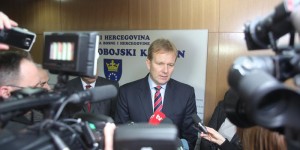This interview was originally published in the daily Dnevni Avaz on 10 August 2015
The Labour Law is a step forward but dialogue is certainly needed. Social dialogue is a prominent feature of the EU acquis communautaire. We strongly encourage both the government and the unions and the employers to engage in such social dialogue, said the Deputy Head of the EU Delegation in BiH, Renzo Daviddi. We asked him how official Brussels views the situation in the Federation following the adoption of the Labour Law, that is, the atmosphere created by the current authorities in confrontation with the unions.
The government created a charged atmosphere, and the reason lies precisely in the way the Labour Law was adopted…
The requirement for the adoption of the law is not something that came up yesterday, it has been around for years. It had been part of the previous letter of intent of the government under the previous IMF agreement. Reforms are not implemented because someone insists that they be implemented, but because they are truly needed. You have a labour market in BiH still burdened by regulations mostly originating from the previous system, which has its own characteristics, rights and privileges. This kind of legislative framework is not adequate in a market economy. We expect further social dialogue in relation to collective agreements.
The recent sessions of the Houses of the FBiH Parliament have shown that there is practically no parliamentary majority. Who will adopt the laws of this government?
It is evident that a firm majority is needed for reforms. I must admit I am a little surprised, even disappointed, that a number of parties, also signatories of the Written Commitment for the EU, did not demonstrate their adherence to it through their engagement. At the same time, among the parties in the Parliament that voted against this law, there are some forces which in the past had strongly supported precisely this reform.
I can understand that there are things in the Law which are problematic. I also understand the criticism about how the Government conducted the dialogue. I am also aware of the criticism of procedural matters. But I hope that in the next steps, because there is a very long list of reforms, parties that have opted for the EU will vote in favour of implementing the reform package.
Yes, but it is one thing to have the right intentions to implement reforms, and therefore laws, but the quality of these laws is another matter. Are all laws proposed by this government necessarily good laws?
I agree that this need not be the case. But in every parliamentary democracy, you have the possibility to act through amendments, through dialogue, to change certain aspects of a piece of legislation. If some parties believe, or come to believe in the future, that certain regulations are not aimed at reforms, they have ways to act on this, to improve such legislation. With the proper argumentation, I think a consensus can be reached about a piece of legislation.
In general, are we as a country in a position to regain lost ground on our path to the EU?
Objectively speaking, there has been some progress. I expect and hope that things will continue to move in a positive direction. I hope that the authorities will have the capacity from this moment until the end of the year to show results in fulfilling EU requirements.
How important is the upcoming summit in Vienna for BiH?
The summit is a very specific step, it is an attempt to link the countries of the region in a very concrete way with the communication channels in the EU. This, of course, does not pertain only to transport. This process will last until 2020 and significant funds will be made available. Commissioner Johannes Hahn spoke about a billion Euros in that period. About a hundred million Euros has already been secured in advance of the summit.
Have the BiH authorities done their homework?
The BiH side has determined certain priorities at the ministerial meeting in Pristine. The documentation has been submitted and is currently being evaluated. I hope that we can now move on to the phase of financing projects. The most important thing is that these are projects ready for rapid implementation. Because the available funds cannot wait around to be spent.
What is your view of the document of the Ministry of Security of BiH indicating a link between crime and the authorities?
I have not seen this document, so I cannot comment on it. We view the fight against corruption and organised crime as something extremely important and a top priority. The whole enlargement strategy, not just for BiH, has been revised so that chapters 23 and 24 are the first ones to be opened in the negotiations process. We will be following the actions of the authorities, and the EU is prepared to secure significant funds through IPA and technical assistance programmes.



